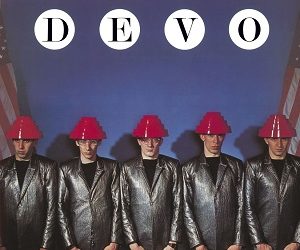We’re off on Monday for the US holiday, with new posts to resume on Tuesday.
Instead of my usual self-indulgence of accompanying such announcements with a related piece of music, today I wanted to a run through some recent books about music for those looking for summer reading. As I noted back in April of 2020, my pandemic isolation escapism largely consisted of a combination of space operas and books about recent musical history. There is a joy in reaching an age where all of the bands you grew up seeing have reached a sufficient level of maturity to be able to tell their story well, sparking old dusty neurons back to life and driving a re-discovery of what you loved about their songs.
Another great joy comes from our current age of abundance, which I wrote about back in 2015. The internet, and YouTube in particular, continues to be a treasure trove of previously unseen instances capturing a particular age. With that in mind, some thoughts on recent musical biographies with accompanying video of the very early days of the musicians in question below.
DEVO The Brand/DEVO Unmasked
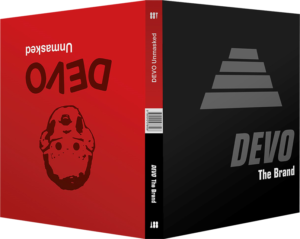 As much a coffee table art book as a biography, DEVO The Brand/DEVO Unmasked came as something of a revelation in realizing that Devo is less a band and much more a long-running art project encompassing music, film, performance, fashion, marketing, and graphic design. The group formed on campus in the aftermath of the Kent State shootings in 1970, and Devo pre-dates much of what we think of as “punk rock” and “new wave”, although those labels were later applied. There was something special about a band based in Akron, Ohio, far away from the musical scenes of New York or London, that let them become fully-formed and completely weird before being noticed by the outside world. The book catalogs that formation in a visual manner, and for me it was fascinating to see what an early influence their visual aesthetic has had on me, dating back to the revelatory moment of seeing their appearance on Saturday Night Live in 1978 and becoming a lifelong fan. Below find rare footage of one of Devo’s first sojourns to New York, a live set from Max’s Kansas City in 1977.
As much a coffee table art book as a biography, DEVO The Brand/DEVO Unmasked came as something of a revelation in realizing that Devo is less a band and much more a long-running art project encompassing music, film, performance, fashion, marketing, and graphic design. The group formed on campus in the aftermath of the Kent State shootings in 1970, and Devo pre-dates much of what we think of as “punk rock” and “new wave”, although those labels were later applied. There was something special about a band based in Akron, Ohio, far away from the musical scenes of New York or London, that let them become fully-formed and completely weird before being noticed by the outside world. The book catalogs that formation in a visual manner, and for me it was fascinating to see what an early influence their visual aesthetic has had on me, dating back to the revelatory moment of seeing their appearance on Saturday Night Live in 1978 and becoming a lifelong fan. Below find rare footage of one of Devo’s first sojourns to New York, a live set from Max’s Kansas City in 1977.
Face It by Debbie Harry
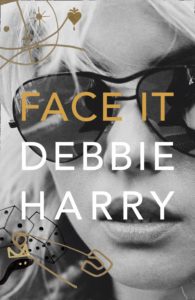 Speaking of Max’s, in her early years in New York, Blondie’s Debbie Harry waitressed there (as well as doing a stint as a “bunny” at the NY Playboy Club). Face It is a little different from most musical biographies, as Harry largely sowed her wild oats in New York for years before forming Blondie and, in many ways, settling down. The book focuses less on the music and more on the personalities and life in this pivotal period in the city. There are some great Warhol and Basquiat stories, and what was particularly interesting was getting a sense of how the band’s embrace and efforts to bring attention to diverse musical styles like reggae and rap (“Rapture” was the first rap song ever to hit number one on the charts) was more an act of rebellion against those demanding musical purity tests than the “selling out” they were accused of. This, along with the challenges of being a woman in rock music, parallel nicely with the stories told in the Talking Heads book below. A light, but charming read. Below find Blondie onstage at CBGB’s in 1975:
Speaking of Max’s, in her early years in New York, Blondie’s Debbie Harry waitressed there (as well as doing a stint as a “bunny” at the NY Playboy Club). Face It is a little different from most musical biographies, as Harry largely sowed her wild oats in New York for years before forming Blondie and, in many ways, settling down. The book focuses less on the music and more on the personalities and life in this pivotal period in the city. There are some great Warhol and Basquiat stories, and what was particularly interesting was getting a sense of how the band’s embrace and efforts to bring attention to diverse musical styles like reggae and rap (“Rapture” was the first rap song ever to hit number one on the charts) was more an act of rebellion against those demanding musical purity tests than the “selling out” they were accused of. This, along with the challenges of being a woman in rock music, parallel nicely with the stories told in the Talking Heads book below. A light, but charming read. Below find Blondie onstage at CBGB’s in 1975:
Remain In Love by Chris Franz
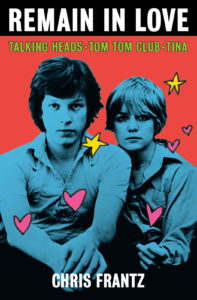 Chris Franz, drummer and founding member of Talking Heads offers Remain in Love, a history of the band and a book-length love letter to his supremely talented wife, bassist Tina Weymouth. Franz’s account is largely good-natured and charming, though painstakingly detailed in some areas (set lists for shows) while glossing over major events (substance abuse issues within the band). Unlike most musicians of that scene, Talking Heads were well-off kids from the suburbs, and were much more focused on their art school (Rhode Island School of Design) roots than just mere survival (Patti Smith, immediately dismissed them with, “I wish my parents were rich enough to send me to art school.”). Aside from singing the praises of Weymouth and noting the prejudices she had to overcome, Franz is largely focused on taking down the mythos of David Byrne. As Byrne has remained the most visible of the former members of the band, he has largely given the impression of being the creative force behind their music, which Franz shows, through continuous examples of the collaborative nature of Talking Heads’ songwriting process, is largely untrue. While he revels in the amazing music they were able to create together, Franz is unsparing in describing how difficult it was to work with someone so unwilling to give credit to anyone else (repeatedly “accidentally” claiming songwriting credits on several albums that had to be later corrected), or even to make basic human connections. Byrne apparently spent most of the band’s existence trying to fire Weymouth, despite her enormous contributions to their music. Aside from the interpersonal difficulties, this is a fun book, and like Harry’s above, filled with great stories about the music and art worlds of New York in the 1970s. Below, some rare footage of Talking Heads at CBGB’s in 1975:
Chris Franz, drummer and founding member of Talking Heads offers Remain in Love, a history of the band and a book-length love letter to his supremely talented wife, bassist Tina Weymouth. Franz’s account is largely good-natured and charming, though painstakingly detailed in some areas (set lists for shows) while glossing over major events (substance abuse issues within the band). Unlike most musicians of that scene, Talking Heads were well-off kids from the suburbs, and were much more focused on their art school (Rhode Island School of Design) roots than just mere survival (Patti Smith, immediately dismissed them with, “I wish my parents were rich enough to send me to art school.”). Aside from singing the praises of Weymouth and noting the prejudices she had to overcome, Franz is largely focused on taking down the mythos of David Byrne. As Byrne has remained the most visible of the former members of the band, he has largely given the impression of being the creative force behind their music, which Franz shows, through continuous examples of the collaborative nature of Talking Heads’ songwriting process, is largely untrue. While he revels in the amazing music they were able to create together, Franz is unsparing in describing how difficult it was to work with someone so unwilling to give credit to anyone else (repeatedly “accidentally” claiming songwriting credits on several albums that had to be later corrected), or even to make basic human connections. Byrne apparently spent most of the band’s existence trying to fire Weymouth, despite her enormous contributions to their music. Aside from the interpersonal difficulties, this is a fun book, and like Harry’s above, filled with great stories about the music and art worlds of New York in the 1970s. Below, some rare footage of Talking Heads at CBGB’s in 1975:
Cool Town: How Athens, Georgia, Launched Alternative Music and Changed American Culture by Grace Elizabeth Hale
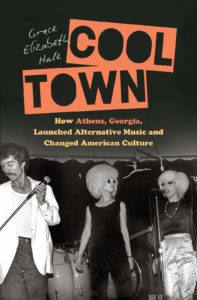 While I was too young (and too far away) to experience the New York musical scene of the 1970s in person (Legs McNeil’s Please Kill Me remains the definitive account), Cool Town offers and insider’s view of 1980s Athens, GA, and the culture that sprung up around the University of Georgia’s art school. As someone who both grew up in the South and became old enough to see bands in bars (albeit in Boston and New York) during this period, the book felt particularly relevant. Athens marked a major shift in rock music development, where small epicenters of creativity would form and nurture bands — even in unlikely places — rather than being focused solely on the largest cities. It created a model of a supporting culture where bands had time and space to experiment and grow, most famously followed by the Grunge scene in Seattle years later. Athens also provides a cautionary model of how, once such a culture is recognized and begins being observed by the wider world, it largely ends that special incubation period and it becomes something else. Cool Town offers documentation of the great bands of the time, first the The B-52’s, then Pylon and Love Tractor, and finally, the biggest band to emerge from Athens, R.E.M. It’s interesting to read about how R.E.M. was both embraced by the town and largely disdained by hardcore scenesters because they dared to have ambitions toward success, rather than just making art for art’s sake. The author, now a history professor at the University of Virginia, does a nice job balancing how the scene both embraced Southern US culture while at the same time defying its stereotypes, at least around sexual identity. The examination of how predominantly White the culture of alternative music was is particularly thoughtful. The book does gets a bit precious at times, often the case for a history written by one of its participants and suffers a bit from earnest proclamations about how special “we” were, but overall it offers some great insight into such an unlikely important cultural force. Below find R.E.M at the 688 Club in Atlanta from 1981:
While I was too young (and too far away) to experience the New York musical scene of the 1970s in person (Legs McNeil’s Please Kill Me remains the definitive account), Cool Town offers and insider’s view of 1980s Athens, GA, and the culture that sprung up around the University of Georgia’s art school. As someone who both grew up in the South and became old enough to see bands in bars (albeit in Boston and New York) during this period, the book felt particularly relevant. Athens marked a major shift in rock music development, where small epicenters of creativity would form and nurture bands — even in unlikely places — rather than being focused solely on the largest cities. It created a model of a supporting culture where bands had time and space to experiment and grow, most famously followed by the Grunge scene in Seattle years later. Athens also provides a cautionary model of how, once such a culture is recognized and begins being observed by the wider world, it largely ends that special incubation period and it becomes something else. Cool Town offers documentation of the great bands of the time, first the The B-52’s, then Pylon and Love Tractor, and finally, the biggest band to emerge from Athens, R.E.M. It’s interesting to read about how R.E.M. was both embraced by the town and largely disdained by hardcore scenesters because they dared to have ambitions toward success, rather than just making art for art’s sake. The author, now a history professor at the University of Virginia, does a nice job balancing how the scene both embraced Southern US culture while at the same time defying its stereotypes, at least around sexual identity. The examination of how predominantly White the culture of alternative music was is particularly thoughtful. The book does gets a bit precious at times, often the case for a history written by one of its participants and suffers a bit from earnest proclamations about how special “we” were, but overall it offers some great insight into such an unlikely important cultural force. Below find R.E.M at the 688 Club in Atlanta from 1981:
Discussion
1 Thought on "Off for the Fourth of July — A Few Recent Book Reviews With Musical Accompaniment"
Thanks, David. Fun read!
